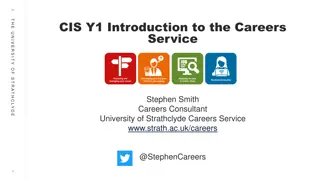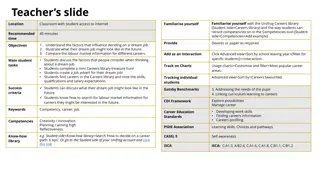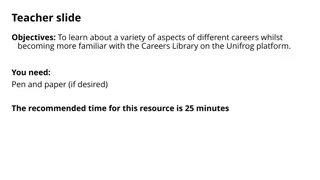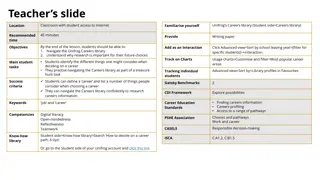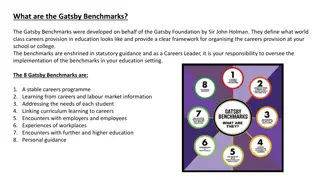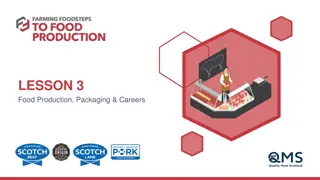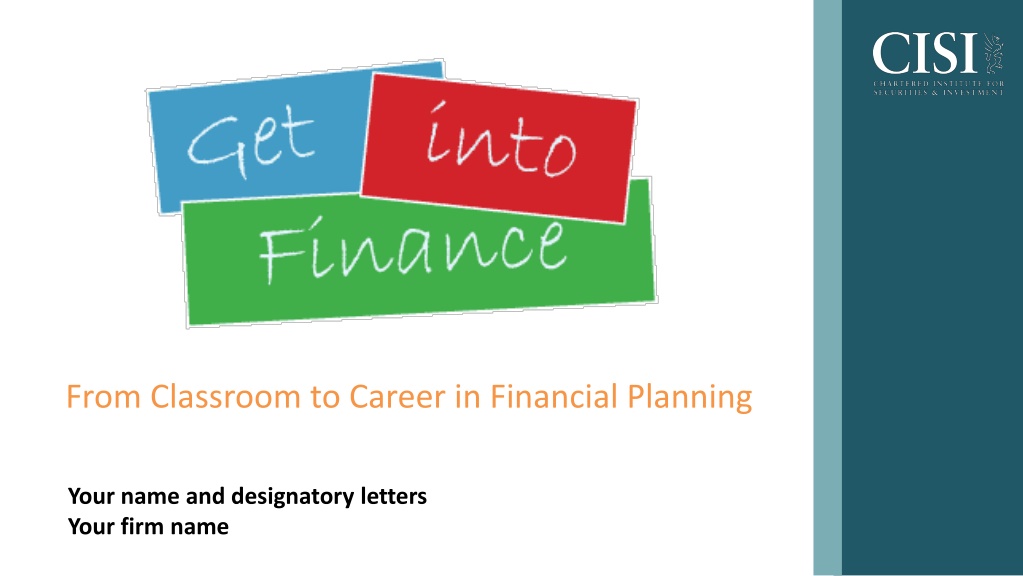
Career Path: Financial Planning Essentials for Success
Explore the fundamentals of financial planning, from setting goals to budgeting and seeking professional guidance. Learn why financial planning is crucial for achieving your life goals and how to navigate the process effectively. Get insights on the difference between financial planning and advice, and discover the six-step approach to creating a successful financial plan.
Download Presentation

Please find below an Image/Link to download the presentation.
The content on the website is provided AS IS for your information and personal use only. It may not be sold, licensed, or shared on other websites without obtaining consent from the author. If you encounter any issues during the download, it is possible that the publisher has removed the file from their server.
You are allowed to download the files provided on this website for personal or commercial use, subject to the condition that they are used lawfully. All files are the property of their respective owners.
The content on the website is provided AS IS for your information and personal use only. It may not be sold, licensed, or shared on other websites without obtaining consent from the author.
E N D
Presentation Transcript
From Classroom to Career in Financial Planning Your name and designatory letters Your firm name
Todays session: What is Financial Planning? Why Financial Planning? How to get into Financial Planning?
What is Financial Planning?
What is the difference between financial planning and financial advice?
What is Financial Planning? Financial Planning is an ongoing process to help you make sensible decisions about money that can help you achieve your goals in life
Its a six step process 1. Establish your goals 2. Gather data 6. Monitor and regularly review 3. Evaluate your current position 5. Implement your plan 4. Develop a plan
The basics of financial planning: Budgeting A budget enables you to see exactly how much money you spend each month. It will help you to see where you re spending too much money that will enable you to direct the money to where you want it to go. Write down your spending and earnings Keep a spreadsheet Are you in the Black or Red? Monitor Spreadsheet MS Money
How do you plan your finances? You can do this on your own or for more complex needs a Certified Financial PlannerTM could help Identify what is most important to you in life your life goals Work out the timescales and costs of each goal Work out how to get to where you want to be in your life, by planning your finances so that you can achieve your goals http://tbn2.google.com/images?q=tbn:SdSaRyoZYp2aFM:http://sirsha02.files.wordpress.com/2008/01/may05_ahluwalia_advertorial.jpg http://tbn1.google.com/images?q=tbn:PkjVdTZkT2iTMM:http://www.ama.ab.ca/images/images_content/Insurance_getting_married.jpg See full size image
Why is Financial Planning important? By working out your goals and creating a structured financial plan to get you there, you will: Feel in control of your life Have a plan for contingencies Reduce stress Have a much clearer view of your future Without it, you may drift through life and risk your most important goals, or never see them realised
This is your life 100 90 80 70 60 50 40 30 20 10 0 20 25 30 35 40 45 50 55 60 65 70 75 80 85 90 Human Capital Financial Capital
Principles of Financial Planning - Make your Plan 1. 7.Get yourself protected to avoid hardship for your partner/family should you fall ill or die Define your priorities: short, medium & long term Work out your net worth: assets - debt = net worth 2. 8.Sort out a retirement plan Draw up a budget & stick to it 3. Invest: Make your money work harder for you ensuring the right asset allocation and using tax efficient savings where appropriate 9. Debt: Borrow when you only have to. Pay off as quickly as you can 4. Save up a 3 month emergency fund and hold on deposit 5. 10.Spread the word: teach your parents/ siblings/ friends about money- the earlier they learn, the better they will be at managing their money. Save up to fund your short & medium term goals 6.
Why Financial Planning as a career? A rewarding career Good opportunities for progression Client facing roles and research roles Range of specialisations Help facilitate peoples everyday lives Helps people to achieve their goals in life
Why do people value their relationship with their Financial Planner so highly? Financial Planners are experts helping people work out their goals and dreams and generate the money to meet them CERTIFIED FINANCIAL PLANNERTMis the global symbol of excellence in Financial Planning
How to get into Financial Planning?
Entry routes Apprenticeships Paraplanner Financial Adviser Degree Financial services/Economics/Accountancy General Training (on the job) Certificate in Paraplanning Certified Financial PlannerTM (CFP) Certification University
What skills do you need? Customer or Client Service Numeracy Communication
Lets do some financial planning . 1. What is important to you financially? Short, longer term 2. Do you know how much you spend every month?
Resources to help www.cisi.org/wayfinder Access tips, resources and guides to help you plan your finances. www.cisi.org/getintofinance The CISI offers a wealth of material, qualifications and support to help you get into finance. www.cisi.org/yourmoney The #yourmoney book and app provides a comprehensive introduction to the world of money. www.moneyadviceservice.org.uk A resource to help you manage your money better.
Thank you for listening Your questions...
Stay connected cisi.org/linkedin cisi.org/youtube @the_cisi @CISI



